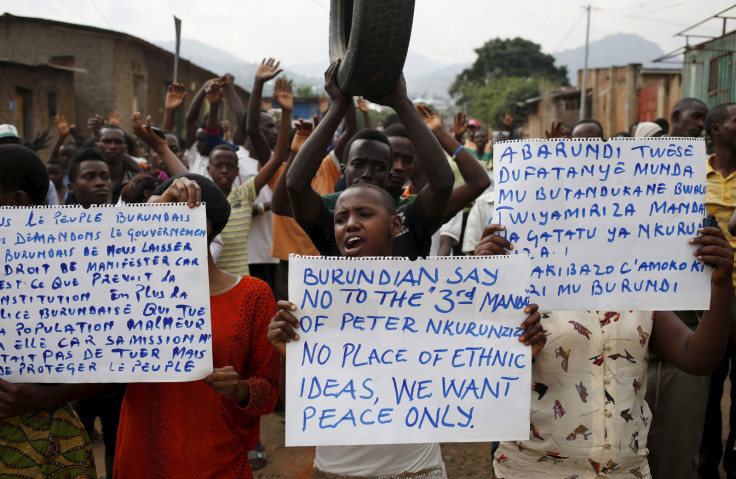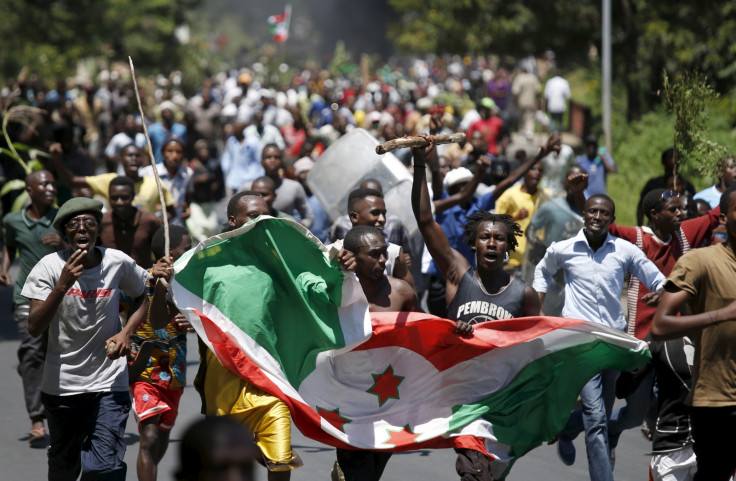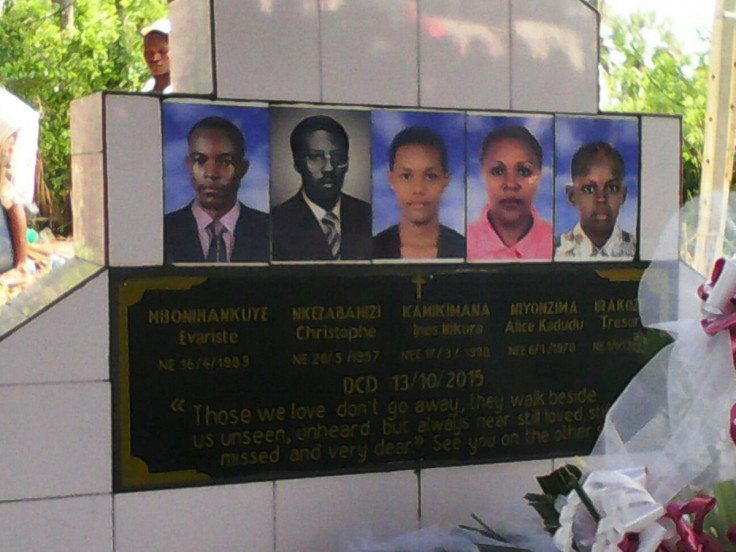Burundi hears echoes of anti-Tutsi hate speech that sparked Rwanda genocide

The 1994 Rwanda genocide left more than 800,000 Tutsi and moderate Hutu dead. The catalyst was hate speech against the Tutsi minority spread by Hutu extremists via mass media, radio stations in particular. Radio Mille Colline (RTLMC) told jokes against the "cockroaches" - a derogatory term used to define the Tutsis, who made up 14% of the population.
Burundi
Capital: Bujumbura.
Population: 10.6 million of whom 85% are Hutus, 14% Tutsis, and 1% Twas.
Official languages: Kirundi, French, English.
Colonisation era: Burundi and Rwanda were German colonies from the 19<sup>th century until the end of the Second World War. Then Belgium took control of the so-called "Rwanda-Urundi", modern day Rwanda and Burundi.
Burundi gained independence and established a constitutional monarchy in 1962. It became a republic in 1966.
Civil war: The first democratically elected Hutu president, Melchior Ndadaye, was assassinated by Tutsi extremists three months after taking office in 1993. Hutus started massacring Tutsis and in retaliation, the army, mainly composed of Tutsis, killed thousands of Hutus. This sparked civil war, which claimed at least 300,000 lives.
The Tutsi were depicted as people who had stolen everything from the Hutu and therefore had to be eliminated. Radio stations were also used to preach the so-called "Ten Hutu Commandments", a real guide to racial hatred.
After the then Hutu president Juvénal Habyarimana died in a plane crash together with Burundi's President Cyprien Ntaryamira on 6 April 1994, radio stations and Hutu-led media blamed the Tutsis for the incident. The same night the plane carrying the two presidents was shot down and crashed near the Kigali International Airport, RTLMC gave the go-ahead to start the massacres with the code-message "cut the tall trees".
Other expressions encouraging Hutus to "finish the work" and suggesting places where fleeing Tutsis were likely to hide were part of the daily broadcasts during the tree months of the genocide.

Burundi's recent propaganda echoes Rwanda's anti-Tutsi speeches
Burundi's recent crisis was spurred by President Pierre Nkurunziza's decision to run for a third term despite the fact the country's constitution allowed him to be in power only for two terms. April's announcement sparked violent protests across the nation, with protesters accusing Nkurunziza of violating the constitution and the Arusha Peace Agreement.
Protests and clashes with police caused at least 200 deaths and prompted hundreds of thousands of people to flee to neighbouring countries fearing a civil war could erupt. After the country held presidential elections in July, in which Nkurunziza was re-elected, violence continued while analysts warned that the government and forces loyal to Nkurunziza were disseminating similar anti-Tutsi propaganda as used in Rwanda the genocide.
Although Burundians were originally targeted by authorities for opposing the third mandate, in May the Imbonerakure - the youth wing of Nkurunziza's National Council for the Defense of Democracy party - was accused of trying to kill Burundian Tutsis as part of an intimidation campaign launched to help Nkurunziza win the election.
Furthermore, recent calls for violence against Burundian Tutsis have sparked fears that the conflict might turn into an ethnic cleansing in a country where ethnic-based violence has caused the death of hundreds of thousands of people in the past.
Several analysts and human right groups expressed outrage after the president of the Burundian senate, Révérien Ndikuriyo, called for authorities in the districts of the capital Bujumbura to start the "work" earlier in November.
Ndikuriyo made the remarks during a speech he delivered in Kirundi, the country's national language, in which he used the word "kora", which means "work" or "start work". This is the same code-word used in Rwanda to incite people to kill Tutsis in 1994.
Referring to a 7 November deadline given by President Pierre Nkurunziza calling on people to hand in illegal firearms, Ndikuriyo warned that those who refused to give up weapons would be "sprayed like cockroaches".
Similar to the rhetoric spread in Rwanda to incite people to kill, Ndikuriyo also told the so-called "heads of the districts" that nothing would happen to them and, if they abided by the government's instructions, they would be rewarded with the properties belonging to the "traitors". He also used expressions such as "pulverise and exterminate" opponents who he said are "good only for dying".
Burundi rejected warnings by the international community that violence in the country could lead to a genocide. Government's spokeperson Philippe Nzobonariba also accused US ambassador to the United Nations, Samantha Power, of being biased against Nkurunziza.
The comments were made after Power criticised Nkurunziza for issuing the deadline and for warning that people who refused to hand in weapons would be treated as "enemies of the nation".
Minister for security Alain Guillaume Bunyoni told a news conference on Sunday (8 November) that the disarmament process had been launched "with respect for human rights." He added: "The security forces are there and will stay until peace is restored. And whoever will try to oppose the return of peace will ... have troubles."

Ethnic divide is 'an open wound'
Lionelle Kingsley Bio, vice-president of the UK Burundian Diaspora, told IBTimes UK that Burundians are worried the Tutsi minority might be the target of an ethnic-cleansing given the recent anti-Tutsi propaganda and the fact that killings are increasing in those areas populated mainly by Tutsis.
"This not an ethnic problem, it is a political problem. People who opposed the third term included Tutsi, Hutu and Twa, but the history of ethnic cleansing in Burundi is an open wound and, when something goes wrong, there is a chance that the conflict between Hutu and Tutsi can erupt at any moment," said Kingsley Bio.
"It has become clear from the words used by this illegal government that officials are preparing a genocide. [The government] will divide the population. They want to justify their wrongdoing by trying to get the [Hutu] majority on their side. They have gone as far as to provoke Rwanda, our neighbouring country that has got the same history as Burundi."
Since Burundi descended into chaos, independent journalists and media outlets have been closed down. Kingsley Bio also said that, as happened in Rwanda, radio stations are being used to call on people to help authorities. "They are spreading messages saying that if the police fail and the army fails, the 9 million Hutu will not fail. Families are decimated," said Kingsley Bio.
"This is not just a threat, this has become a reality for Burundians. Part of the populations in Bujumbura are not allowed to leave their neighbourhoods. The international community is talking about negotiations, but how can we negotiate with someone who is killing our people?"
However, Uganda-based independent journalist and analyst Fulvio Beltrami, thinks that Nkurunziza is not supported by the majority of Hutu in the country and therefore the calls of ethnic cleansing might fail. He told IBTimes UK: "Nkurunziza tried to shift from a political crisis to an ethnic one, but it seems that he is failing as the majority of Hutu power do not support him."
Rwanda's reaction to violence in Burundi
Relations between Rwanda and Burundi started deteriorating in 2012 and worsened during the recent Burundian crisis. Following increasing violence, Kagame urged Burundi to learn from history and avoid another genocide.
Nkurunziza accused the neighbouring nation of training rebels to destabilise the country. Rwanda denied the claims, but expressed concern at reports claiming violence in Burundi was linked to the Hutu rebel group Democratic Forces for the Liberation of Rwanda (FDLR).
The FDLR includes members of the Interahamwe, or "those who stand together", a Hutu paramilitary organisation responsible for the 1994 Rwanda genocide. The organisation left Rwanda and sheltered in DR Congo in the aftermath of the ethnic cleansing.
Some reports alleged that Nkurunziza spread violence through the Imbonerakure, which has been allegedly brainwashed with genocide propaganda during training in eastern Congo by the FDLR. Burundi dismissed the claims.
© Copyright IBTimes 2025. All rights reserved.






















